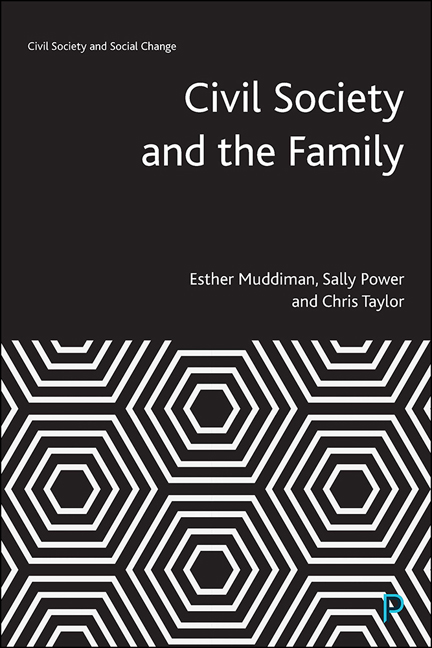Book contents
- Frontmatter
- Contents
- Tables
- Figures
- Notes on the Authors
- Acknowledgements
- 1 Starting Points
- 2 The Paradoxical Positioning of the Family and Civil Society
- 3 The Challenges of Researching the ‘Private Sphere’ of the Family
- 4 The Uncertain Business of Raising Citizens
- 5 Keeping the Faith? Secularisation, the Family and Civic Engagement
- 6 Mothers, Grandmothers and Civic Engagement
- 7 Family Arguments: Finding one’s Voice
- 8 Politicising Family Food Practices
- 9 The Upward Transmission of Civic ‘Virtues’
- 10 Reframing Civil Society and the Family
- References
- Index
7 - Family Arguments: Finding one’s Voice
Published online by Cambridge University Press: 18 March 2021
- Frontmatter
- Contents
- Tables
- Figures
- Notes on the Authors
- Acknowledgements
- 1 Starting Points
- 2 The Paradoxical Positioning of the Family and Civil Society
- 3 The Challenges of Researching the ‘Private Sphere’ of the Family
- 4 The Uncertain Business of Raising Citizens
- 5 Keeping the Faith? Secularisation, the Family and Civic Engagement
- 6 Mothers, Grandmothers and Civic Engagement
- 7 Family Arguments: Finding one’s Voice
- 8 Politicising Family Food Practices
- 9 The Upward Transmission of Civic ‘Virtues’
- 10 Reframing Civil Society and the Family
- References
- Index
Summary
Introduction
This chapter explores the subject of family arguments – a subject that has been largely overlooked by sociologists. Where family arguments have been the subject of social-scientific enquiry, they are usually approached from a psychological perspective. Within contemporary society, conflict within families tends to be viewed either as an indication of family dysfunctionality or as an inevitable developmental phase of adolescence. However, we want to argue that family arguments are also sociologically and socially significant.
We begin this chapter with a very brief overview of the sociology of family arguments and a discussion of some of the methodological and conceptual challenges of researching them. We then examine the ‘landscape’ of family arguments, using evidence from our survey of young people. In addition to charting who argues with whom, we focus on the principal subjects that our young people argue about with their parents, and on what these tell us about the gendered and ‘raced’ dimensions of family regulation. We then go on to look at the significance of arguments within the family for young people's practices outside the family. Our data indicate that young people from families that argue are more likely to participate in a range of civic activities than those from families where the young people report that they never argue with their parents. We then draw on the interviews with their parents and grandparents to explore some of the processes that might explain this connection. Their accounts indicate that for some families, the absence of arguments does not indicate consensus; rather, for a variety of reasons, it indicates an unwillingness to engage in discussion that might risk conflict. However, other families appear to celebrate and even schedule these ‘risky’ discussions, and use them to foster independence and articulacy.
We conclude this chapter by returning to the debates about the relationship between the family and civil society, as well as how what goes on inside the domestic sphere has significant implications for what happens outside in the public sphere. In particular, we discuss the nature of ‘civility’ and its connection with civil society.
- Type
- Chapter
- Information
- Civil Society and the Family , pp. 125 - 140Publisher: Bristol University PressPrint publication year: 2020



